Director: Drake Doremus
Writers: Drake Doremus, Ben York Jones
Stars: Felicity Jones, Anton Yelchin and Jennifer Lawrence
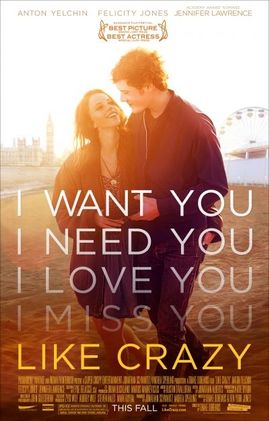 I love you; I want you; I need you – sums the first part of this year’s romantic drama, Like Crazy – when a British college student, Anna (Felicity Jones) falls for an American student, Jacob (Anton Yelchin), only to be separated from him when she’s banned from the U.S. after overstaying her visa.
I love you; I want you; I need you – sums the first part of this year’s romantic drama, Like Crazy – when a British college student, Anna (Felicity Jones) falls for an American student, Jacob (Anton Yelchin), only to be separated from him when she’s banned from the U.S. after overstaying her visa.
Like Crazy is solid and aggressively entertaining. Unlike its sister relationship movies born out of festivals like Blue Valentine and 500 Days of Summer, it explores some peculiar extenuating circumstances that come to bear heavily on relationships. It combines an important social theme – immigration – with a vital aspect of life – love – into one body of work hitherto not wisely and coherently spelled out. This is why I can admit that Like Crazy is one of the best films this year, and a film you’ll need to see when it hits theaters on October 28, 2011.
When director Drake Doremus was asked at the Philadelphia Film Festival last Thursday, what his over-arching theme in Like Crazy was, he simply added, ‘I wanted to show that love was simple!’
Of course, there was laughter echoing from every corner of the UPENN Annenberg amphitheater as his humorous response filled it. How can it be simple if immigration law complicates it? And this is why I believe his answer warrants a more serious consideration than a jovial brushoff. Let me explain.

It is easy for Like Crazy to corner us into thinking solely about the vicissitudes of love and the naivety with which a young couple may approach it. It is easy to think that, it is out of this innate complexity of love that everything else is affected. Like Crazy can be read like it’s crazy. If Anna is going back to Britain, why fall in love with her? If Jacob is not coming to Britain when my visa runs out, why fall in love with him? These two young college graduates can only be crazy for falling in love.
This is where director Drake Doremus’ answer on the innate simplicity of love itself begs to differ. Like Crazy is rather a social commentary on how circumstances outside of love itself can ruin the permittivity of love. That, love itself being universal is what makes it naive; that it is primitive is what makes it so powerful; and the social constructions of society due to boundaries, countries, race, gender, ethnicity and its concomitant manifestations in visas or freedom papers – are what complicate it.
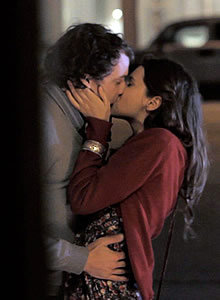 This is the core of the social and emotional theme that Like Crazy expertly weaves neatly within the fabric of the political barriers attendant upon it. What Like Crazy achieves is the intricate juxtaposition of Anna and Jacob’s sense of entitlement to love, vis-à-vis their reluctance to work towards the goal.
This is the core of the social and emotional theme that Like Crazy expertly weaves neatly within the fabric of the political barriers attendant upon it. What Like Crazy achieves is the intricate juxtaposition of Anna and Jacob’s sense of entitlement to love, vis-à-vis their reluctance to work towards the goal.
The cinematography that accentuates and perhaps underscores this important theme was admirably constructed. In a jail-shot at the beginning of Anna and Jacob’s relationship, the director and cinematographer place a glass door between Anna and Jacob. The shot is so reminiscent of a lovemaking scene across the glass windowpanes of a couple during a jail visit. Only that, in this foreshadowing shot, the glass door is unlocked and though Anna and Jacob both realize how much they want to be in each others arms, they are reluctant to step to the other’s side.
They refuse to open this glass door and this scene becomes the defining characteristic of the whole movie and the core of director Doremus’ message – love is simple if you’re willing to make it work; But, will you open that glass door?
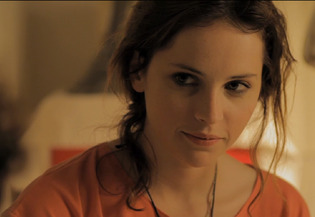 Inevitably, this glass door becomes the visa issue that eats at the core of their infant and simple love. They believe they are entitled to a relationship with each other without the sacrifices necessary to make it work. They believe Anna should be able to ignore the rules of her visa without consequence. Meanwhile, they are reluctant to have a timely marriage that would have removed the barrier to entry for Anna and hence the barrier to love for them both. Even when their relationship peaks, they somehow believe they can have other relationships without any emotional damage to each other.
Inevitably, this glass door becomes the visa issue that eats at the core of their infant and simple love. They believe they are entitled to a relationship with each other without the sacrifices necessary to make it work. They believe Anna should be able to ignore the rules of her visa without consequence. Meanwhile, they are reluctant to have a timely marriage that would have removed the barrier to entry for Anna and hence the barrier to love for them both. Even when their relationship peaks, they somehow believe they can have other relationships without any emotional damage to each other.
And why do we come to believe this wavering tension between the ideal and the realistic? And why do Anna and Jacob feel so entitled? Because Mr. Doremus’ direction and the script — which he co-wrote with Ben York Jones — is so wisely written that we can see how the simplicity of Anna and Jacob’s love is so hideously tainted by all the socially constructed influences and chiefly because of the political barriers (the glass doors) they allow to define their existence as human beings first, and as people who want to be with each other, second.
The naivety hence, stems from this disregard for protecting what is important to love. No matter how much two people may want each other, or think they want each other, to be together there are always such socially and politically constructed variables (glass doors) of practical reality that can crash the party at any moment.
So goes the undeniable logic in this refreshing romantic drama – that as simple as love itself may be, it is the reluctance to open that glass door (work at it), that complicates it. Somehow we tend to believe that love will work itself out through that glass door without opening it ourselves. Or that, if it’s meant to be, then it will be. But why? This is where our naivety rears its most ugly head!
 Though, in the end Anna and Jacob are married and eventually Anna is able to come to the U.S, the ending admonishes us in one way to realize that if their relationship was going to survive, it was going to be based entirely on a new footing. The flame of their old love is quenched; the cold candle, perhaps, remains an important part of them. If anything would come of their love, it will be up to them – it will take work to rekindle the flame that can outshine the pain that laziness, naivety and reluctance had wrecked on something that started out so wonderful and simple.
Though, in the end Anna and Jacob are married and eventually Anna is able to come to the U.S, the ending admonishes us in one way to realize that if their relationship was going to survive, it was going to be based entirely on a new footing. The flame of their old love is quenched; the cold candle, perhaps, remains an important part of them. If anything would come of their love, it will be up to them – it will take work to rekindle the flame that can outshine the pain that laziness, naivety and reluctance had wrecked on something that started out so wonderful and simple.
Hence the message in Like Crazy is much more powerful than the immediate conclusions some critics have gleaned from it. The reading of Like Crazy, I feel, is one that calls on many layered experiences in life and love that I fear that the critics, who have lambasted this movie – calling it callow and banal – completely lack in all its nuances and intricacies.
If you can watch this movie and call it frivolous and fraudulent then you are just another hater looking in the wrong places. Like Crazy is a fine piece of cinema that broadly reaches out to the young at heart and the infant in love to transcend the glass doors of race, gender, sexuality, class, country and caste in love; that if you can see your loved one through that glass door, then you might, perhaps, reach out and open it before it’s too late! It is not that complicated after all.
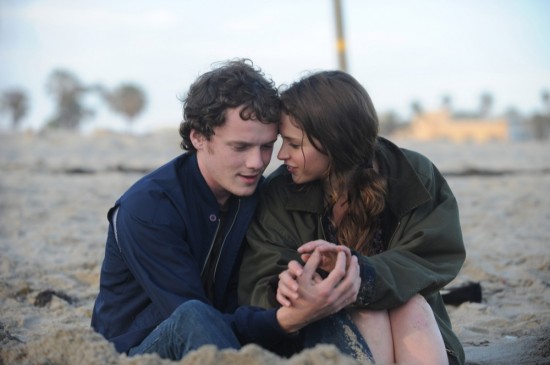

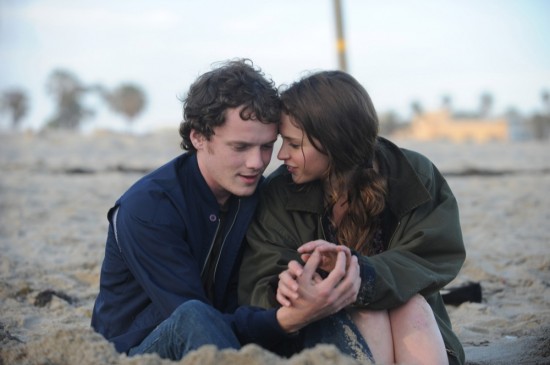









Your review is just Like Crazy!
okay… gonna try to be young at heart and fall. But I fear falling.
I have tried to understand this movie. But whenever I think I do, I just get more confused. After reading this and the other reviews, I am thoroughly confused. Completely confused. Is it just me?
What is the confusion?
Some critics claim they two were stupid, that the whole relationship was doomed from start. Daité claims here that the two were in fact just doing the right thing, and if they had realized that they would taken necessary steps to keep it the way it was from start. What is it? I am interested in what the director wants us to think!
Well, I think he wants it to be interpreted in various ways. That’s his point, I thought.
I just hate these movies these days with this so-called open ended interpretations.
I agree. I saw one recently at the Ritz in Philadelphia called MARTHA MARCY MAY MARLENE (bad title anyway). It was worse. Somehow people seem to like it a lot – won Best Director at Sundance so I don’t know what to say.
This was one of the great ones.
Corinne Bailey Rae sang it best “Young and Foolish”. They were two kids who hadn’t grown up yet. And the end of the movie is open-ended but if you think they have grown up then they will make it work but if you think they are still kids, they will let each other get away again. I really felt the movie. It was well done.
Most of whatever you state is supprisingly precise and that makes me ponder the reason why I had not looked at this with this light before. This article truly did turn the light on for me personally as far as this specific subject matter goes. However there is just one issue I am not too comfy with so while I try to reconcile that with the core idea of your point, allow me observe just what all the rest of the readers have to say.Well done.